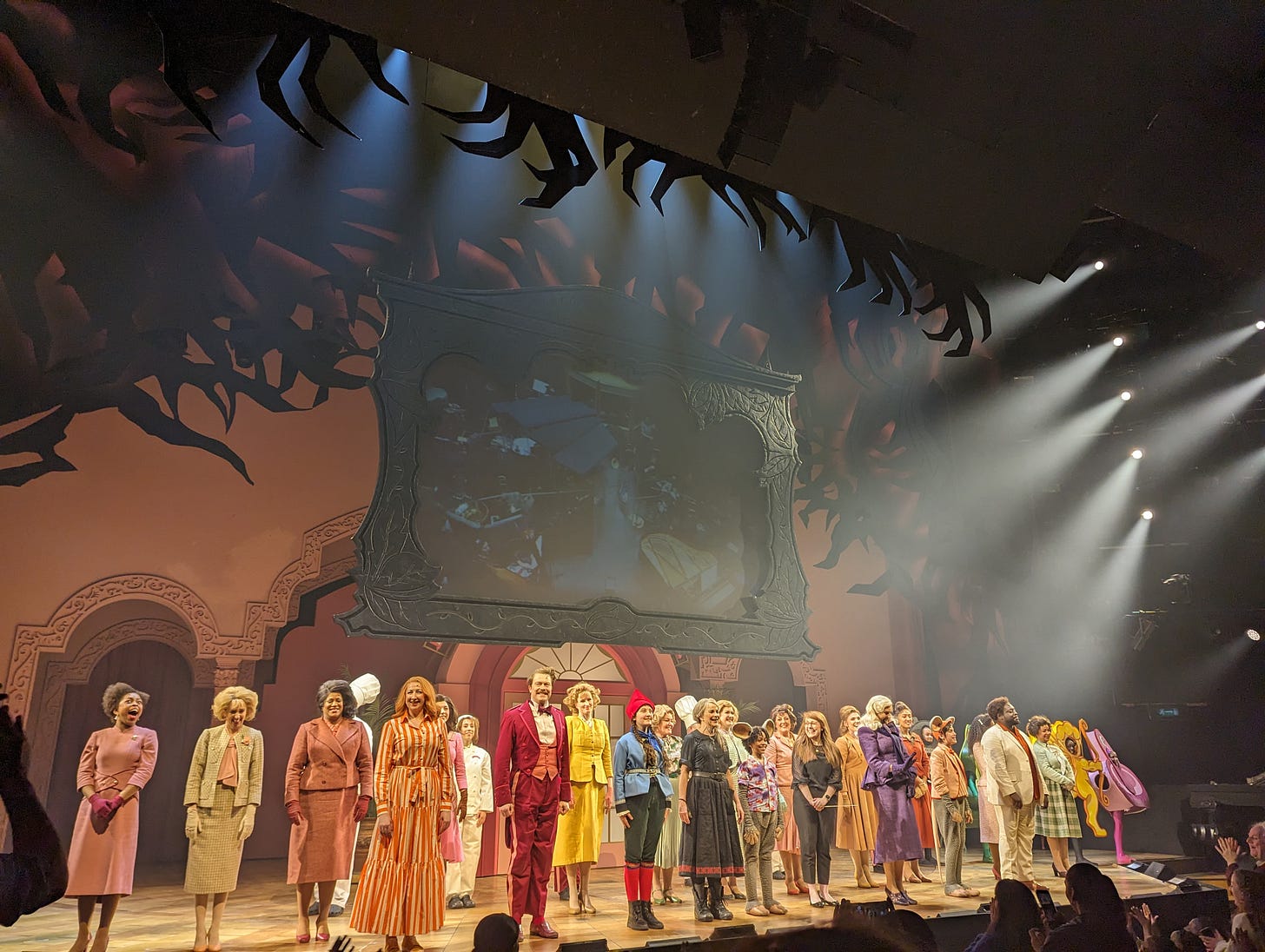Happy Weekend. We’ve all survived another week!
I hear you ask - aren’t you already doing a catch-up series and only part way through? Why yes I am, thank you for remembering, and my 12-days-of catch up will resume in good time. By which I mean my good time (or perhaps sweet time) and nobody else’s.
We’ve now passed one month without M in the world. Since I last saw her and carried away the entreaty You must write, I have joined a local writing group, a fortnightly writing salon, attended a writing class and done a little bit of - gasp - writing. I’ve read the last book she sent me and seen some shows. I’ve also questioned my life choices, berated myself for tardiness and cried an appropriate amount. Often, oddly, whilst driving familiar roads on semi-autopilot and either daydreaming just a little or hearing something triggering on the radio. If I’m a teensy bit blinded in the process, nobody worry because, as stated, I’m very familiar with the routes. Also the car does have lane assist and I’m good at pulling my shit together.
It’s always hard to know how to respond to the grief of another, particularly if it’s not a shared bereavement. My friends have been pretty wonderful, and my mum magics up the exact right words. Others employ a silent look of sympathy, and that’s fine too. I think the well-meaning instinct for many when someone they know is grieving is to provide a distraction or optimistic interpretation. There’s nothing wrong with that, it can be helpful and provide relief. BUT - pain demands to be felt.
As much as I appreciate everyone who serves as a tether to the continued joy of alive-ness, I also welcome the sadness of living. Trying to avoid it will only defer it, probably to emerge in some awful conflagration at a later date. You can’t procrastinate when it comes to emotions - at least, not without reprisal. I’m leaning into the desire to simply dwell with my grief and let each wave immerse me.
That’s not to say I haven’t been coming up for air. The Arts can be relied upon for escapism. So, 5 short reviews for you - and I recommend reading them in a browser.
Cirque du Soleil’s Alegría: In a New Light, Royal Albert Hall. 17th Jan.
The concert hall is busy with gymnasts, coaches and gymnastics officials who attend each year. Mum - a brevet judge, writer of national gymnastics rules and absurdly under-appreciated volunteer (what is this, motherhood?) - is greeted by someone new every two seconds. The couple of young gymnasts who’ve accompanied us are suitably impressed by how ‘famous’ she is.
There is something spellbinding about the circus, especially one as professional as Cirque. During almost every act I become aware of a tensing of muscles, as if ready to jump up and join in. Because sure, I could do that. Totally. There’s acro, tumbling, synchronised aerial swinging and extraordinary hula hooping. I’m particularly enrapt by Ghislain Ramage’s Cyr Wheel act and an Arial straps duet from Yulia Makeeva and Alexey Turchenko, who make feats of strength and skill seem effortless and emotive. This is the kind of showmanship all gymnasts should strive for in their sport. Falaniko Solomona Penesa’s fire dance and the flying trapeze finale were standout crowd pleasers in a production returning to London 30 years on from its debut.
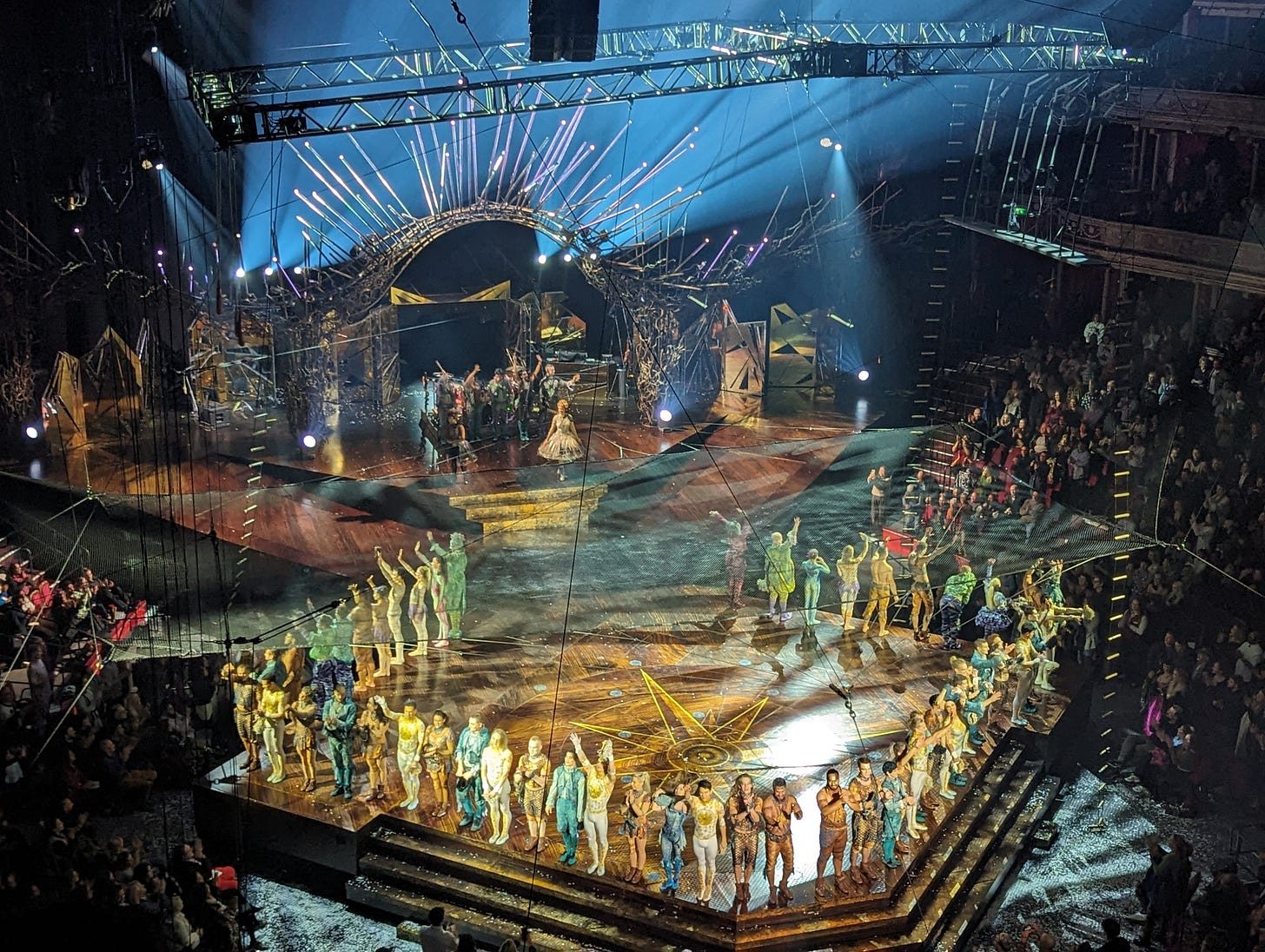
Amidst a loose plot of a power struggle between the old and new orders following the death of a monarch (hello Britain, wink, nudge), clowns Pablo Bermejo and Pablo Gomis Lopez bring heartwarming comedy between the acrobatics. They depict a volatile friendship beset by the human follies of greed and envy, with Beckettian tones carrying through as they bicker, break-up and make-up. One reconciliation scene ushers in an immersive snowstorm that engulfs the audience and sends children pulling scraps of tissue paper from their hair to save as mementos.
The blend of theatre, music and physical artistry revived the memory of a theatre jaunt with M to see Emma Rice’s adaptation of Angela Carter’s Wise Children at the Old Vic. The retrospective knowledge that M was nearing the end as I was basking in this exuberance is - actually, somewhat poetic. Wouldn’t we all like to pass into a realm of wonder where people soar through the air? I hope the suspension of death feels as freeing and weightless as the trapeze artist looks mid-flight.
The pace of Alegría is, inevitably, uneven. But the show, as always, is sublime.
Cirque du Soleil: Algeria runs at the Royal Albert Hall until the 3rd March.
The Witches, The National Theatre. 25th Jan.
I’m sorry to say that the run of Lyndsey Turner’s production, adapted From Roald Dahl’s novel about metamorphosed children who, as mice, switch the scales to thwart misopaedic witches, has now ended. It was pretty tricky nabbing tickets in the first place - perhaps an indication of demand for more family-friendly shows? I wouldn’t be surprised to see a transfer for this show, if only to National Theatre At Home.
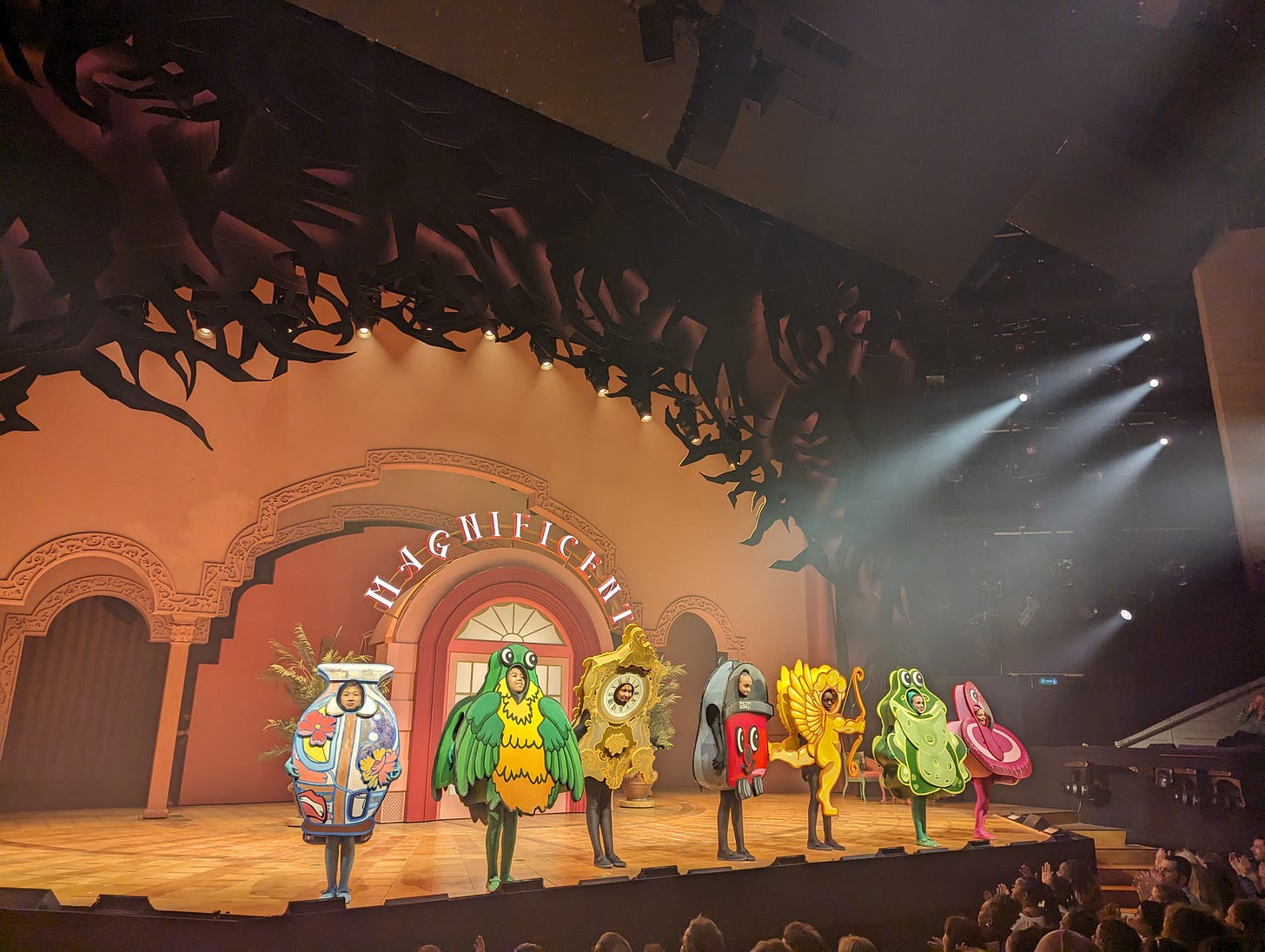
A nostalgic classic for me, having grown up with books of this ilk. I always loved the disregard of taboo and grim humour in Roald Dahl’s stories and Lucy Kirkwood’s script is full of gags. Some hit better than others. Daniel Rigby, similar to his recent turn in Accidental Death of an Anarchist, is funny but exhausting as the unravelling hotel manager Mr Stringer. Katherine Kingsley’s Grand High Witch steals the show on both humour and musical hits. Her standout number ‘Wouldn’t it be Nice?’ denigrates the woes of childcare and feels highly relatable (despite not having kids) as Kirkwood and Dave Malloy’s lyrics keep us laughing.
The odd song feels a bit repetitive though the singing is impressive throughout. Among the talented cast of children on this particular night, Frankie Keita is convincing as Luke, the orphaned main character who becomes a short-lived but contented mouse. Chloe Raphael is impressive as the gnome Helga and George Menezes Cutts is particularly self-assured as the posh and flirtatious chocaholic boy/mouse Bruno.
The message is not only a celebration of child triumph but a send-up of rigid femininity that makes women (well, witches) hide their true selves beneath pinching shoes, pastel suits and mundane jobs. The sigh of relief when the shoes and wigs come off has me empathising with the villains because who’s to say what is natural: the maternal or the monstrous? We are rooting for the glamorous child-hating High Witch almost as much as Luke’s kooky cigar-smoking, revenge-fuelled grandma, played by Sally Ann-Triplett.
As Dahl wrote, “It doesn't matter who you are or what you look like so long as somebody loves you.” I guess I love a good weirdo and a great villain.
Mousetrap, St Martin’s Theatre. 1st Feb.
It was the 29,470th performance.
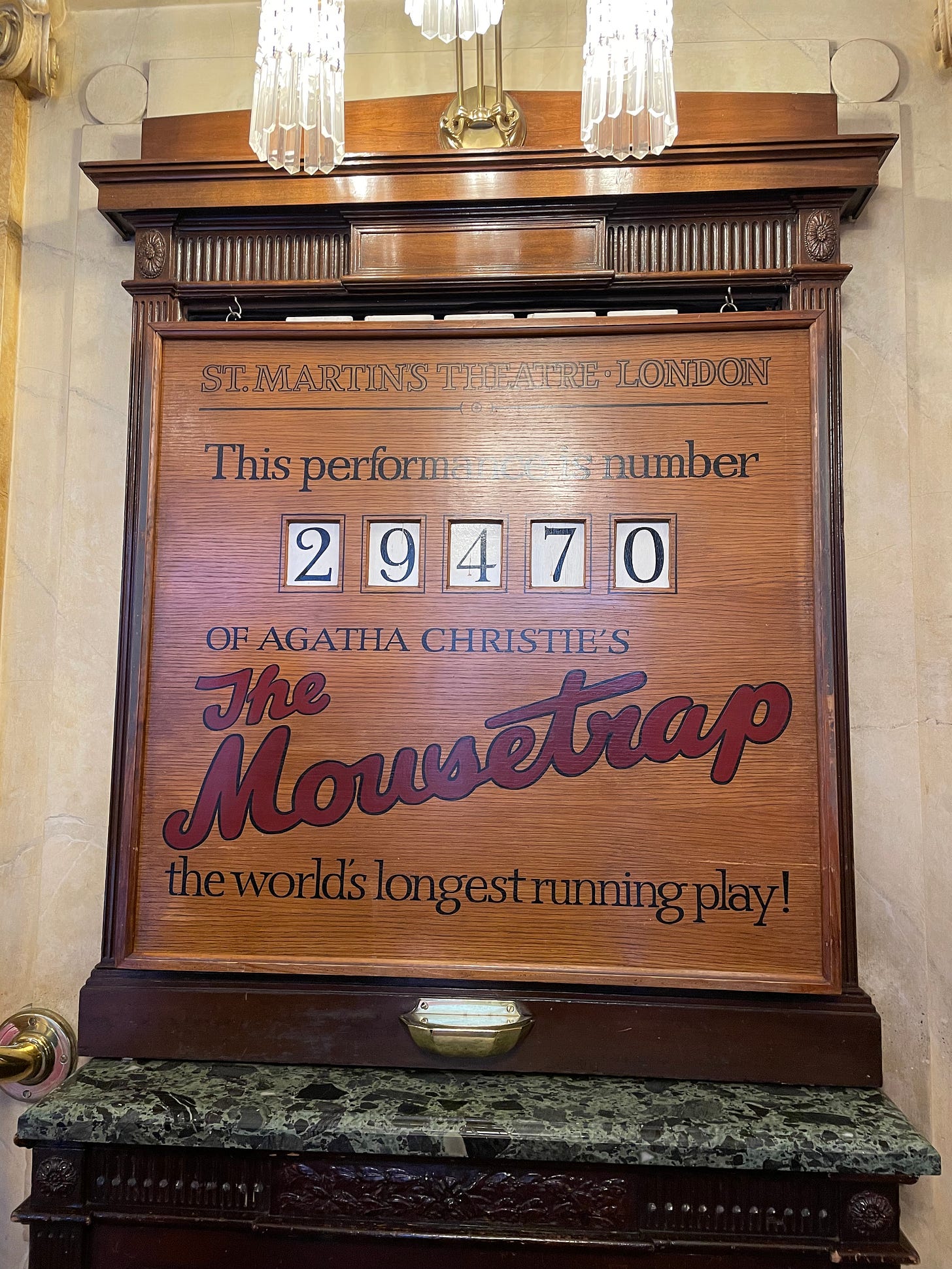
And I’m not sure I can say much more than that because I’m keeping the secret of the world’s longest-running show, which opened in London 72 years ago. I feel like one of the last remaining people to see it and am glad to finally tick it off the bucket list. Suffice to say, it’s an Agatha Christie classic that captured the attention of every sugar-loaded schoolboy seated a row in-front.
The Mousetrap is currently booking through to 14th September 2024.
The World According to Kaleb, Assembly Hall Theatre. 9th Feb.
It’s a wild card night out with my sister, who binged the first two seasons of Clarkson’s Farm along with so many others. I don’t know what to expect of Kaleb Goes on Tour, and in the first half I’m struggling to pin down a genre. Comedy? Polemic? Educational or Motivational Spoken Word? All of the above, plus TV snippets, powerpoint slides complete with telescopic teacher pointer and an audience-participation tractor race, all rolled in for extra confused hilarity. But it works.
Kaleb Cooper of Chipping Norton is a country lad. His tour excludes London - we’re in (Royal) Tunbridge Wells, and close enough to the city for his liking. He has a casual swagger and slightly nervous style of speech, with indiscriminately littered ‘therefore’s attempting to tidily string together various stories and yarns - whether teenage business progressions, economic commentary or haircut choices. It’s an endearing combination of earthy common sense and unpolished charm. You can tell that ‘stage star’ is a new role arising from his breakout streaming success as, well, himself: the young, knowledgeable, piss-taking farmer perpetually shaking his head over Jeremy Clarkson’s agricultural endeavours. But Kaleb is clearly also a fast, hands-on learner who throws himself into new opportunities, so why not a stage tour?
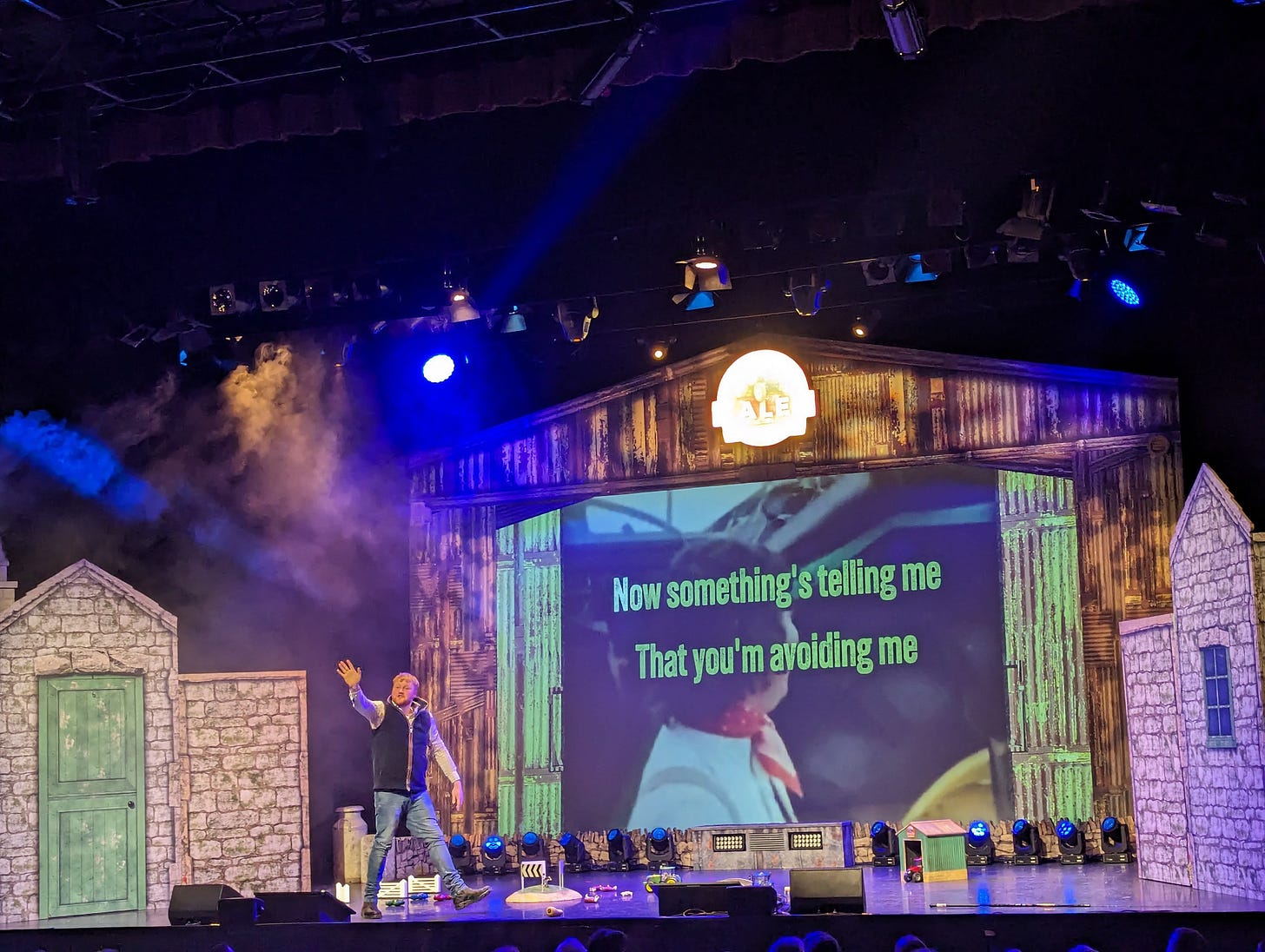
This impression is confirmed by his impressive backstory, starting as a school-skiving teenage egg-seller to become a successful farming contractor with a growing tractor collection. The topics under discussion range from his haircuts (the perm is a favourite) and hatred of sheep to personal heroes and serious agricultural issues, inluding:
The impact of low milk prices for dairy farmers
The National Curriculum and routes into the farming industry
Farming and climate action
Initiatives for farmers and meeting PM Rishi Sunak at the Farm to Fork summit
In light of current farmers’ protests, both in the UK and the EU, Cooper’s insights were a welcome aspect of an entertaining and informative evening.
I had no expectations going in, and was pleasantly surprised. Quote of the show: “They wouldn’t let me bring a bucket of actual shit on stage… I’d have loved to, but…”
The World According to Kaleb is on tour until the 8th March.
This Might Not Be It, Bush Theatre. 10th Feb.
This is the type of show that I book on a whim months ahead because of the abbreviation ‘NHS’ is in the description, then forget about until the reminder email.
The Bush is one of those lovely little community theatres right next to Shepherd’s Bush Market, where you can have a drink and pick up the screenplay of a current production for under a fiver. The performance spaces are small and intimate, and if the show’s good you’ll feel like you’ve stumbled upon a wonderful secret. If not, you’ll slowly die of mortification in your seat, wishing you were in a larger venue that can be discretely slipped out of.
Fortunately, This Might Not Be It, written by former Bush Emerging Writers’ Group member Sophia Chetin-Leuner, falls into the former category. The play is set in the outpatients admin office of a Children and Adolescent Mental Health Service (CAMS), exploring the behind-the-scenes daily reality of our strained Mental Health services. We cover big issues and small details in the interactions between the on-stage cast of three: Angela (Debra Baker), the experienced and inured middle-aged administrator who, after 30 years in the job, is stuck in her ways and part of the furniture. In comes Jay (Denzel Baidoo), the 20-year-old temp and aspiring occupational therapist, with his desk plant and ideals. Beth (Dolly Webb) is a troubled patient discretely fast-tracked by Jay who’s soon to end up back on a waiting-list for adult services.
The binaries of age, gender and race all serve to emphasise the tension between the new co-workers as Jay ruffles feathers in his attempt to digitise a reluctant Angela’s outdated filing system. Piles of folders are packed and unpacked throughout but the waitlist never seems to diminish; an inefficient shuffling that surely parallels the daily game of human Tetris played by our over-stretched and under-resourced NHS. Angela advises her young colleague ‘The system is there for a reason. And it’s not the best system but it’s much better than your personal opinion, okay?’
Petty slagging off and plant-sabotage start off funny but boil over with serious consequences, just as Jay and Angela find common ground and move beyond their prejudices. Angela has to unlearn the conflation of caring with naïveté: ‘You care a lot, that’s nice. It shows your age.’ she tells Jay early on, but also warns ‘Oh darling, there’s no such thing as progress around here’. Jay begins to appreciate how Angela’s come to be the cynical pragmatist she is, and breaking that cycle seems to be the play’s key occupation.
Because of course, it really isn’t ‘okay’ that our national health service is crumbling, that people in serious pain are deemed ‘non-urgent’ or that those working in the care sector are so ground down as to become inured. This Might Not Be It grapples with big issues whose solutions are less straightforward than we’d wish. Further ethical dilemmas arise in subplots with patient Beth and off-screen manager Gary, but it’s more than the 90-minute play can be expected to do justice.
This is an issues play, resonant of those in the 1970s but not quite so uncompromising. Here, optimism and the potential for change remain. Silence is the real killer in this play, and talking is the therapy to be found both within and without the consultation room - for the patients and for those who keep the imperfect system lumbering on.
This Might Not Be It runs until 7th March, but is now sold out.
***
So, let me know which of those sound like your cup of tea.
Perception governs interpretation. In all of these shows I see the presence of death and change - of a king, a young mouse, a murder victim, an industry and way of life and those who might not receive the needed care. But in each of them the prospect or reality of death is a catalyst for something else - change and progress, closure or catharsis. Most things are double-edged: love is recompensed with pain, grief repays the gift. The magnitude of one is answered by that of the other. And poise is the mission around here. Light / dark, past / future - M loved binaries. The tension of paradox is so deliciously rich. Right now, I’m letting some nice things balance out the rest and inhabiting the liminal.
More Anon,
Dot xx





